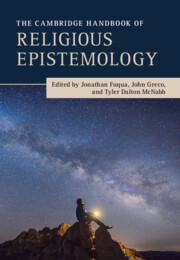Introduction
Published online by Cambridge University Press: 24 August 2023
Summary
The questions of faith and reason, taken up in this book in great detail, are universal across time and place; nor have they gone away with the Enlightenment, the rise of modern science, or the epistemological cynicism of postmodernism. One finds extensive and serious philosophical discussion of things divine, of God and the gods, throughout the history of philosophy, East and West, down to the present day. The human being is an animal, but in most cases is also a “believer.” In a nod to the extensive body of scientific work on humanity’s religious proclivities, some have even called the human being “the believing primate” (Schloss and Murray 2009). As the “believing primate” designation suggests, religious belief seems to bear an interesting and unclear relationship with reason. For one thing, without reason, no one could have any religious beliefs nor engage in any religious practices based on those beliefs. To be a believing primate, you have to be a rational animal (the latter designation being, of course, Aristotle’s famous definition of the human person). In that sense, at least, religion is rational: To be religious you have to be rational.
- Type
- Chapter
- Information
- The Cambridge Handbook of Religious Epistemology , pp. 1 - 10Publisher: Cambridge University PressPrint publication year: 2023



